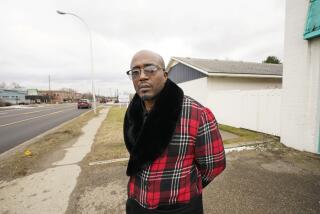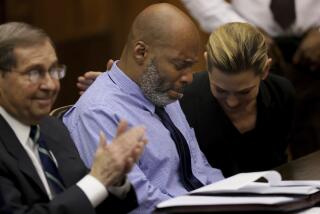Fund-Raising Letter Aids Imprisoned Koon : Crime: Plea portrays him as a scapegoat. It stretches the truth, describing Rodney King as a PCP-crazed murder suspect.
- Share via
The book publisher for Stacey C. Koon, the former Los Angeles Police Department sergeant serving prison time for the beating of Rodney King, has circulated a mass appeal for donations to help Koon’s struggling family and help him appeal his federal civil-rights conviction as far as the Supreme Court.
The letter, which bears Koon’s letterhead and signature, has been sent out nationwide in recent months under the auspices of the Stacey Koon Defense Fund, run out of a mail drop in Glendale. It has generated enormous financial support from police officers and citizens for Koon, his wife and their five children, according to Koon’s Washington, D.C.-based publisher, Regnery Publishing Inc., which organized the fund-raising effort.
But the letter, which the publisher said was “basically” written by Koon himself, is filled with politically volatile assertions, half-truths and unsubstantiated allegations.
In it, Koon lambastes King as a PCP-crazed homicide suspect at the time of his arrest in 1991 and says King was not struck in the head with police batons and “only suffered minor injuries when finally forced to the ground.”
Some of those are assertions that court evidence and even Koon’s former lawyer indicate are unproven or untrue. Koon, currently serving a 30-month sentence in federal prison in Dublin, Calif., could not be reached for comment.
The four-page typeset letter also claims that Koon and convicted Officer Laurence M. Powell “are the political scapegoats of black radicals and self-serving liberal politicians who know that we are innocent.”
In the letter, Koon is quoted as telling readers that when they hear “the whole story, (they) will be shocked, stunned and convinced that my officers and I were sold out by weak politicians and a deceitful news media.” Until then, he asks readers for as much as $1,000 from each of them so he and Powell can appeal their cases and get out of prison before being killed by cop-hating inmates.
“That will take dollars,” Koon writes, “lots of them.”
But it isn’t clear how much money has been raised so far or where all of it is going.
The publisher of Koon’s 1993 book, “Presumed Guilty: The Tragedy of the Rodney King Affair,” said this week the letter was his idea and that Koon had help writing it.
Alfred S. Regnery, president of Regnery Publishing, said most of the money would go to Koon’s family and to pay his legal bills. But he acknowledged that wrapped in with the fund-raising letter was a sales pitch: Give the former sergeant’s defense fund a $30 donation or more and get a copy of his book.
Regnery said those copies would be given to the defense fund at “slightly over cost” but declined to say how much money the publishing company and defense fund would keep before passing the rest along to Koon and his family. He said he was not trying to make a profit from increased book sales.
The fund-raising appeal has been aimed not only at police officers but regular citizens as well, Regnery said, and it has generated thousands of responses and donations. “It’s been very good,” he said.
“Actually, it’s been astoundingly good. Much higher than we anticipated, in terms of the number of responses and the size of the contributions.”
Because the defense fund is not a political entity or charitable group, it does not have to report to state or federal watchdog agencies how much money it has raised and how much of that it has passed along to its intended benefactor, according to the state attorney general’s office.
Some have questioned the motivation of the fund-raising letter, saying it is a revisionist history that distorts the facts established in the two King-related trials and divides the city as police officials and city leaders continue to promote healing in the wake of the 1992 riots.
LAPD officers beat King, an African American, on March 3, 1991, after he refused to pull over his car and led them on an eight-mile chase. Koon and three other officers were found not guilty in state court and those verdicts ignited three days of rioting.
Police officials declined to comment on the letter, and Koon’s current and former lawyers took pains to distance themselves from it.
“It is remarkable,” said Laurie Levenson, a Loyola Law School professor who monitored the federal trial last year in which Koon and Powell were found guilty of violating King’s civil rights and were each sentenced to 30 months in prison.
“You see defendants do this type of fund-raising,” Levenson said, “but it is problematic when it becomes deceptive and misleading.
Although there are laws that prohibit the use of the mails to obtain money through misleading communication, Levenson said it is unlikely that anyone will try to apply them to Koon.
In recent weeks, Koon’s letter attracted the attention of Los Angeles bunco squad detectives who investigate fraudulent fund-raising efforts. After a short investigation, the effort was found to be legitimate and the matter was dropped, police sources said.
Identifying inaccuracies in the letter requires only a cursory review of evidence presented in the King beating and civil-rights trials. Even Laurence Powell’s first name is spelled wrong.
Blood tests taken after King was arrested did not offer evidence that he was under the influence of PCP when he was subdued by police, although the letter states as fact that he was. The accused officers have long maintained that King displayed signs of PCP intoxication.
The letter also states that King needed to be subdued so aggressively because he was “the prime suspect in a homicide at the time of his arrest”--another contention that prosecutors and defense lawyers agreed was untrue.
Asked how such a charge made its way into the letter, Regnery said: “I can’t remember where that came from.”
And despite the letter’s assertions that King was injured only by falling to the ground, doctors who testified for the prosecution at Koon’s federal trial testified that King’s face was fractured in 15 places, most probably from blows landed by a police baton or similar weapon. Doctors who testified for the defense disputed that account, saying that King’s injuries were in fact the result of one or more face-first falls to the pavement.
Levenson also criticized the tone of the letter, which asserts that if Koon and Powell are not exonerated during their appeals, police won’t subdue criminals in the future. “Neither you or your family will be safe from the likes of hardened criminals like Rodney King,” the letter states.
“It is a blatant call for sympathy and financial support,” Levenson said. “The disturbing thing about it is it . . . continues to throw up a divide at a time when we are trying to heal relations between police and the community.”
Deputy Dist. Atty. Alan Yochelson, who prosecuted the state case in which Koon and three of his subordinate officers were acquitted of improperly beating King, also said some of the assertions in the letter are at odds with testimony given during the trial.
Even Koon’s lawyer in that case, Darryl Mounger, questioned whether the former sergeant would include such inaccuracies and contested facts in a public appeal for money.
“It certainly doesn’t sound like something Stacey would do,” Mounger said. “I would not think Stacey Koon would acquiesce to someone else writing that letter, certainly because some things in there are not true.”
Regnery, however, maintains that the fund drive is a sincere effort to help a cop who he says was hung out to dry by his city and Police Department. The two became friends, he said, when Koon spent a week at his house during a promotional tour for his book last year.
“When he went to prison, he seemed to me he was getting screwed and needed whatever help he could get,” Regnery said.
Regnery said Koon’s wife, Mary, prefers not to comment about her family’s plight. But in the letter, Koon says his wife has “suffered horribly” through the ordeal as have his children: Matthew, 15, Gregory, 13, Alicia and Kimberly, 8, and Jennifer, 4. “While I am sent to prison,” he writes, “who will take care of them?”
Some of Koon’s legal bills already have been paid. The police union already has paid at least $150,000 for his lawyers and court costs in the two trials. But Regnery and others said his bills are likely to climb as his appeal proceeds and that his family’s expenses are mounting while he is in prison.
The U.S. government also has appealed Koon’s sentencing, saying that U.S. District Judge John G. Davies erred in calculating the appropriate sentences for the two convicted officers.
After being suspended without pay in 1991, Koon was finally dismissed from the department several weeks ago after a short administrative hearing. His lawyers have contended that the city treated Koon unfairly for suspending him for so long without pay and because it did not pay his legal bills as it has in some other cases.
More to Read
Sign up for our Book Club newsletter
Get the latest news, events and more from the Los Angeles Times Book Club, and help us get L.A. reading and talking.
You may occasionally receive promotional content from the Los Angeles Times.







